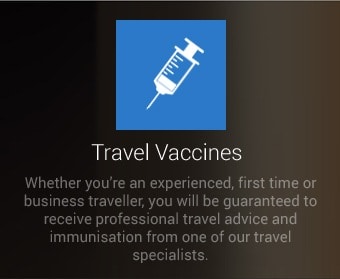Travel Vaccination |
Tick-Bourne Encephalitis |
Tick Bourne Encephalitis
What you need to know Tick Bourne Encephalitis
Tick-Bourne Encephalitis is a serious viral infection that can cause flu-like symptoms including high temperature, headache, joint and muscle pains. In more serious case people can develop inflammation of the spinal cord and brain (encephalitis), affecting the mental and nervous state of the infected person which requires hospitalisation.
As the name suggests, Tick-Bourne Encephalitis is spread by infected ticks. They live in the grass and can easily attach themselves to the clothing and skin of people walking by. The infection is spread to people when they are bitten by the tick. The infection, which is present in the saliva of the infected tick, also contains a natural anaesthetic, which can make it difficult for people to register that they have been bitten.
High-risk areas
Tick-Bourne Encephalitis is mainly found in forested areas. High-risk areas include:
- Eastern Russia and Siberia
- Parts of China and Japan
- Western Russia
- Austria
- Hungary
- The Balkans
- Czech Republic
- Slovakia
- Scandinavia
Signs and symptoms
Tick-Bourne Encephalitis produces clinical features similar to those of many other types of meningitis and/or encephalitis. The initial onset of symptoms is usually one to two week after a tick bite. Symptoms include fever, headache and general flu-like illness, nausea, muscle pain, lethargy and general discomfort. Some patients may go on to develop encephalitis, which can cause paralysis and can be fatal in some cases.
The vaccine
Travellers should consider being vaccinated against Tick-Bourne Encephalitis if they are at risk of tick bites when working walking or camping in endemic areas. The vaccination requires a course of three doses for full protection. The second dose is given one to three months after the first dose, and provides immunity for about one year. A third dose, given 5–12 months after the second, provides immunity for up to three years.
A booster dose can be given up to three years after the third dose for continued protection. Boosters can continue to be given every three to five years if protection is still necessary.
Understandably, many of our travellers leave for trips at the last minute, and we will be able to vaccinate you leading up to the day of travel. The vaccination course can be accelerated over two weeks if necessary, providing short-term protection for 90% of people. The Tick-Bourne Encephalitis vaccine is not suitable for babies younger than one.
Bite avoidance is emphasised to all travellers by protecting the skin with clothing, tucking long trousers into socks, insect repellents and keeping to designated pathways. Also, avoid drinking unpasteurised milk in areas at risk.
| Vaccination | Doses | Schedule and Validity | Price* |
| Tick Encephalitis (TicoVac) | 3 | Doses at 0, 1-3 & 6-12 months. | £70.00 |
|
*Price per dose. Please see the dosage to calculate the overall cost. *Prices are subject to change please contact us for the latest pricing. |
|||





